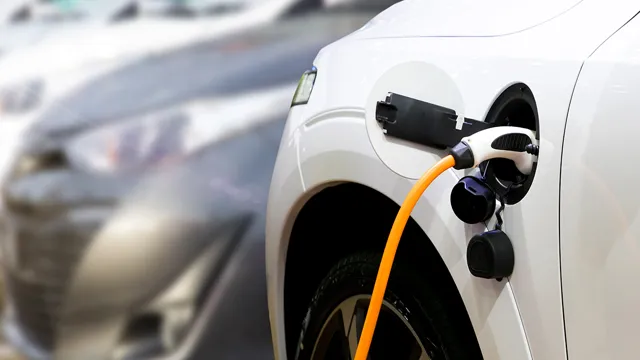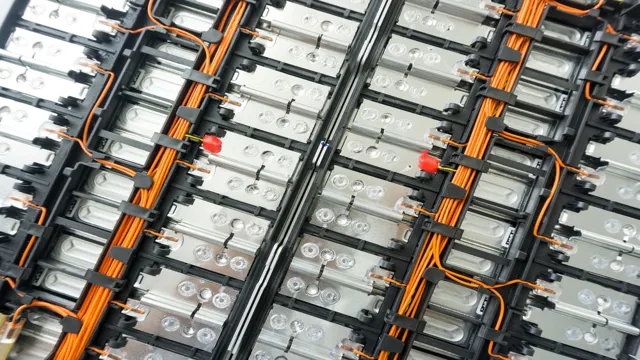Revving Up: Examining the Reliability of Electric Car Batteries
Electric cars have gained immense popularity recently due to the ever-increasing sustainability concerns. They offer incredible benefits over traditional gasoline-powered vehicles, including reduced carbon emissions and quieter operation. However, concerns around the reliability of the electric car battery leave many potential buyers uncertain.
When they consider purchasing an electric car, the question of whether the battery will perform with reliability and durability often comes up. Despite early concerns about the reliability of electric car batteries, technological advancements have brought about improved battery efficiency and performance. The batteries, which were once heavy and bulky, have become smaller and lighter, delivering an increased driving range per charge.
Additionally, electric car batteries have a longer lifespan than before, and modern-day models come with warranty coverage. Reliability issues with electric car batteries are decreasing day by day, thanks to advances in technology and increased competition among the manufacturers of electric vehicles. The future looks promising as car manufacturers continue to work on developing higher capacity batteries that can charge much faster than their current counterparts.
Without a doubt, electric cars are the future of the automotive industry. With better battery reliability, more consumers will begin accepting the electric cars as a long-term replacement for gasoline-powered vehicles. As charging infrastructure is rapidly expanding and improving, switching to an electric vehicle isn’t as difficult as it used to be.
Electric cars offer a smoother, quieter ride that has many benefits beyond reliability.
Definition of battery reliability
When it comes to electric car batteries, reliability is of utmost importance. The term battery reliability refers to the ability of the battery to perform consistently and efficiently over time. A reliable battery will have minimal degradation and a long lifespan, providing the vehicle with consistent power and range.
This is crucial for electric cars, as the battery serves as the vehicle’s main power source. To ensure battery reliability, manufacturers use advanced materials and technologies to improve the battery’s performance and durability. Additionally, regular maintenance and proper charging habits can help extend the battery’s life and maintain its reliability.
In summary, electric car battery reliability is essential for the overall performance and longevity of the vehicle, making it a top priority for both manufacturers and consumers.
Examining the data on electric car battery failures
Electric car battery failures are a growing concern for consumers and manufacturers alike. Battery reliability refers to the ability of a battery to function properly and consistently over time. In the case of electric car batteries, reliability is crucial to maintaining the overall performance and efficiency of the vehicle.
The reliability of a battery is determined by a variety of factors, including its construction, materials, and manufacturing processes. A battery that exhibits high reliability will be less likely to experience issues such as premature failure, reduced capacity, or inefficient charging. The goal for manufacturers is to create batteries that deliver consistent and reliable performance throughout their lifespan, resulting in a better experience for drivers and fewer warranty claims.
By focusing on battery reliability, electric car manufacturers can improve consumer satisfaction and drive the adoption of electric vehicles.
Comparing the reliability of different electric car brands
Battery reliability is a critical factor to consider when comparing electric car brands. Essentially, it refers to how well a battery can hold and deliver a charge over its lifespan while maintaining consistent performance. Factors that can impact battery reliability include temperature changes, charging habits, and overall use.
Manufacturers are continually working to improve battery technology, and some brands have better reputations than others regarding reliability. It’s important to research and consider the battery warranties offered by different electric car brands, as well as any reported issues with battery performance and potential recalls. Ultimately, choosing a car with reliable battery performance is crucial for maximizing the benefits of electric vehicle ownership, including lower emissions and cost savings on fuel.
Factors affecting electric car battery reliability
When it comes to electric car battery reliability, there are various factors to consider. One of the most significant factors in battery reliability is the age of the battery. As the battery ages, its performance starts to decline, resulting in lower capacity and range.
Another aspect to consider is the temperature, as extreme temperatures can significantly impact the battery’s lifespan. Hot weather, for instance, can cause increased degradation, while very cold weather can reduce battery performance. The type of battery also plays a crucial role, as not all lithium-ion batteries are made equal.
Some batteries are designed for specific purposes like fast charging and high capacity, while others prioritize safety and longevity. The charging cycles and quality of the charger are equally important, as the number of charging and discharging cycles can affect the battery life. Hence, it is essential to use the recommended chargers and charging practices to minimize the impact on battery life.
By considering these various factors, electric car owners can maximize the lifespan of their batteries and ensure reliable, efficient performance.
Temperature and climate considerations
Temperature and climate play a crucial role in determining the reliability of electric car batteries. High temperatures can increase the risk of battery degradation, leading to premature failure and reduced performance. Conversely, extremely cold temperatures can decrease battery capacity and increase internal resistance, making it difficult to charge and discharge the battery.
Extreme weather conditions such as heatwaves and cold snaps can cause a spike in demand for electricity, which can also impact the charging and discharging of electric cars. Furthermore, the geography of an area can affect the temperature and climate, as some regions experience more extreme temperatures than others. It’s important to take temperature and climate into consideration when deciding on an electric car, ensuring that it’s suitable for your local conditions.
By maintaining proper temperature conditions and monitoring your battery’s performance, you can ensure reliable and long-lasting operations.
Driving habits and maintenance
Driving habits and maintenance can have a significant impact on the reliability of electric car batteries. One major factor that affects battery life is the way an electric vehicle is driven. Aggressive driving habits, such as sudden acceleration or hard braking, can put additional stress on the battery and shorten its lifespan.
Similarly, frequent fast charging can also degrade the battery at a faster rate. It’s important to be mindful of these habits and try to drive in a smooth and steady manner to help prolong the battery’s life. Additionally, regular maintenance is crucial to keeping an electric car’s battery in good condition.
This includes monitoring the battery’s state of charge, avoiding extreme temperatures, and keeping the battery clean. By practicing good driving habits and staying on top of maintenance, electric car owners can help ensure their battery remains reliable and long-lasting.
Battery technologies and types
When it comes to electric car batteries, there are several factors that can affect their reliability. One of the most important is the type of battery technology used. Lithium-ion batteries are currently the most common type due to their high energy density and long lifespan.
However, they can be sensitive to temperature changes and may experience degradation over time. Other battery types such as nickel-cadmium and lead-acid may be more durable, but they have lower energy density and are often bulkier and heavier. Another major factor that can impact battery performance is how the battery is used and maintained.
Frequent fast charging and discharging, as well as exposure to extreme temperatures, can reduce the overall lifespan of the battery. Proper maintenance, such as regular charging and avoiding overcharging, can help prolong the life of the battery. Ultimately, choosing a high-quality battery and using and maintaining it properly can help ensure the reliability and longevity of an electric car’s power source.
Tips for improving electric car battery reliability
Electric car battery reliability is a critical consideration for electric vehicle owners. To improve the reliability of an electric car battery, it’s essential to prioritize regular maintenance. Ensuring your EV’s battery is well-maintained can have significant benefits, such as longer battery life and improved performance.
One helpful tip is to avoid fully charging your battery to its maximum capacity too frequently. It’s also important to avoid keeping your EV parked in extreme temperatures, whether hot or cold, as this can damage your battery. Additionally, regularly checking your EV’s battery temperature and charging levels can help identify potential issues before they become significant problems.
By following these tips, you can improve the reliability of your electric car battery and enjoy a more seamless and enjoyable experience driving your EV.
Charging habits and dos and don’ts
Electric car battery reliability can be improved by adopting good charging habits and avoiding certain common mistakes. One key tip is to consistently charge your car’s battery when it is at around 20-30% capacity, rather than waiting until it reaches 0%. Similarly, it is important not to overcharge the battery, as this can cause damage and shorten its lifespan.
Another factor to consider is the type of charger you are using; fast chargers can be convenient, but if used too often they can also damage the battery. It is also recommended to avoid charging your electric car in extreme temperatures- both hot and cold- as this can also negatively affect battery life. On the flip side, keeping your battery at a moderate temperature (around 60-80 degrees Fahrenheit) can help improve its overall health.
By being mindful of these factors and following some simple guidelines, it is possible to extend the lifespan of an electric car battery and enjoy reliable, efficient driving for years to come.
Maximizing battery health through scheduling and low power mode
Electric Car Battery Health If you’re an electric car owner, you know that the battery is the heart of your vehicle. It’s crucial to keep it healthy to ensure optimal performance and longevity. Scheduling your charging times is an effective way to maximize battery health.
Charge during off-peak hours when electricity is cheaper, and avoid charging to 100% all the time as it puts additional stress on the battery. Another way to improve battery reliability is by utilizing low power mode, which reduces load on the battery and extends its life. Additionally, try to avoid extreme temperatures, which can cause battery degradation.
By taking these simple steps, you can ensure that your electric car’s battery remains healthy and performs at its best for years to come. Take care of your battery, and it will take care of you and your electric vehicle.
Final thoughts and future of electric car battery reliability
As electric cars continue to gain popularity, the reliability of their batteries is becoming an increasingly important concern for consumers. Fortunately, the technology behind these batteries is improving rapidly, with manufacturers constantly refining their designs to improve performance and longevity. There are also a number of steps that electric car owners can take to ensure that their battery remains as reliable as possible, such as avoiding frequent deep discharges and keeping the battery within its optimal temperature range.
While there are still challenges to be overcome, such as the limited range of some electric cars and the relatively high cost of replacement batteries, the future looks bright for electric car battery reliability. With continued investment in research and development, it’s likely that we’ll see even better battery performance in the years to come, making electric cars an even more practical and reliable choice for drivers.
Conclusion
In the world of electric vehicles, the reliability of the battery is key to the success of the technology. Fortunately, advancements in battery technology have made electric cars more reliable than ever before. In fact, the electric car battery has become so reliable that it’s left traditional car batteries feeling drained.
So, while you may still experience some range anxiety, rest assured that your electric car’s battery is up to the task. With more and more electric models hitting the market, it’s clear that the future of cars is electric and reliable battery technology is leading the way!”
FAQs
What factors affect the reliability of electric car batteries?
Several factors can impact the reliability of electric car batteries, including temperature, frequency of charging, and age of the battery.
How long do electric car batteries typically last?
The lifespan of an electric car battery varies depending on several factors, such as usage patterns, temperature, and charging frequency. However, most modern electric car batteries can last up to 8-10 years or 100,000-200,000 miles before they need to be replaced.
What maintenance do electric car batteries require?
Electric car batteries require minimal maintenance, but it’s essential to keep them properly charged and avoid exposing them to extreme temperatures for extended periods. Additionally, regular software updates can help optimize battery performance.
What happens to an electric car battery at the end of its life?
At the end of its life, an electric car battery can be recycled or repurposed. Recycling helps recover valuable metals such as cobalt, nickel, and lithium, which can be reused in the production of new batteries. Repurposing can involve using old batteries in energy storage systems or other applications.




